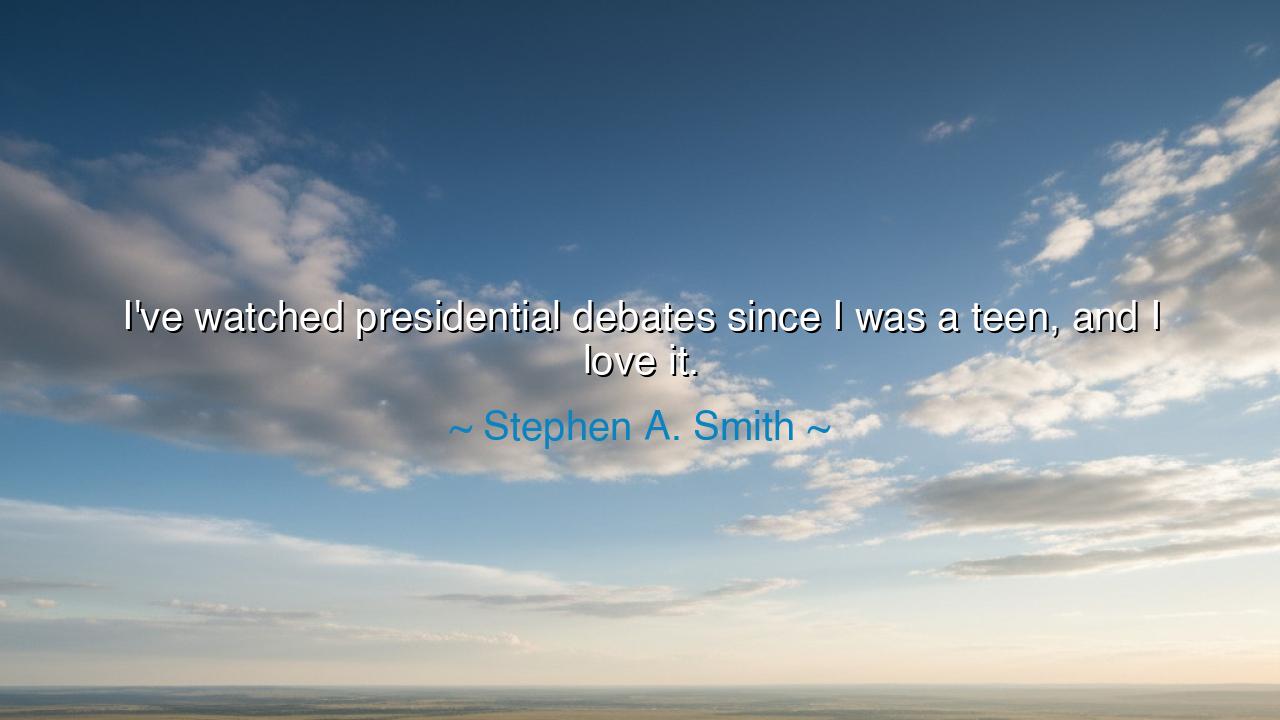
I've watched presidential debates since I was a teen, and I love






When Stephen A. Smith proclaimed, “I’ve watched presidential debates since I was a teen, and I love it,” he revealed a truth about the power of words and the shaping of destiny. For the debates of leaders are not mere contests of policy; they are arenas where intellect, courage, and persuasion collide before the eyes of a nation. To be drawn to them in youth is to be captivated by the drama of human will striving for mastery, and to love them is to recognize that ideas, not only weapons, decide the fate of peoples.
The teen years are a time when the mind awakens to the larger forces of the world. While many occupy themselves with leisure or personal desires, Smith turned his gaze toward the stage where leaders clashed in vision. This reveals the deep yearning of a young spirit to understand power, justice, and truth. Just as the youth of Athens once gathered in the agora to hear Socrates question the foundations of life, so too did Smith, before the glowing screen, listen to the voices that shaped the destiny of America. His love for such debates shows that wisdom begins not in age, but in attention.
The origin of his passion lies in the grandeur of the presidential debate itself. These events, like the contests of old, are the modern equivalent of the Olympic arena—except here the weapons are not spears but words, not shields but arguments. The audience watches, not to see blood spilled, but to see ideas tested, challenged, and defended. To a young mind, this is both spectacle and schooling, for here one learns the art of persuasion, the weight of leadership, and the courage it takes to stand before millions and speak with conviction.
History offers us vivid parallels. Think of the famed debates between Abraham Lincoln and Stephen Douglas. Though they were not yet presidential debates, they set the stage for Lincoln’s rise and forever altered the course of a nation torn by slavery. Those who listened knew they were not hearing mere rhetoric—they were witnessing history being carved in real time. So too, when Smith watched as a teen, he understood instinctively that in these moments, words could tilt the balance of history.
The deeper meaning of his statement is that true strength lies in the contest of ideas. Nations may be built on force, but they endure through discourse. When leaders debate, they reveal not only their policies but their character—their patience, their wit, their vision, or their lack thereof. To love such debates is to love the testing of truth, to honor the belief that the destiny of a people should be forged through reasoned speech rather than silent decree.
From this reflection emerges a clear lesson: train your mind to delight in the contest of ideas. Do not turn away from the debates of your age, nor dismiss them as noise. For even when flawed, they hold within them the seeds of a people’s direction. Listen, question, discern. Learn not only what is said, but how it is said, for rhetoric reveals the soul as much as reason.
Practical action flows from this wisdom. Watch the debates of your time, not as a passive spectator, but as a student of humanity. Take notes, reflect, and discuss with others. Do not be swayed by charisma alone, but weigh words against truth and action. And above all, cultivate the habit of dialogue in your own life—argue not to conquer, but to illuminate, not to humiliate, but to discover.
Thus, Stephen A. Smith’s simple confession becomes a profound teaching. To love presidential debates since youth is to honor the art of discourse as the engine of democracy. It is to recognize that while swords may win battles, it is words that shape nations. And so we pass this wisdom to future generations: cherish the debate, for in the clash of voices lies the pathway to a freer, wiser, and stronger world.






AAdministratorAdministrator
Welcome, honored guests. Please leave a comment, we will respond soon